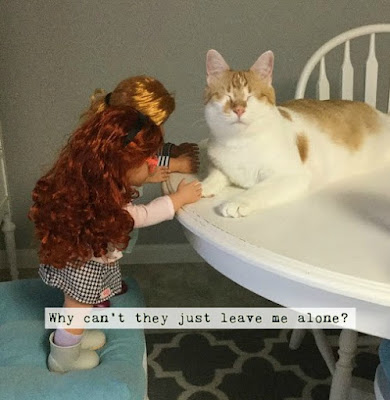What To Do When You Have a Class You Don't Like
Let's get real, teachers. It's not popular (maybe it's even shocking) to say you have a class you do not like. The honest truth is that this happens on a regular basis. If you don't believe me, hang out in the teacher's lounge more often. For me, as I look back through my years of teaching, I notice a pattern. These classes take place at the end of the day. The kids are not focused at all. I'll restate that. They still do not notice the opening assignment on the Smart Board. Nor do they get their materials out and ready. The kids shout across the room to each other. They never have a pencil or a pen. They complain about everything I ask them to do. Some kids fall asleep (I have NO idea how.) And, darn it, they wear me out.
Even as I write this paragraph, teacher guilt creeps in. They're just kids, Lynn. They're not all bad. It's just a few. And the excuses go on and on. In our profession, there is this underlying assumption that we are supposed to be some kind of superhero angels who love all children not matter what. So Johnny just cussed you out. So Susie told you she hates this class, and Anna takes a new pen everyday and never brings them back. We're supposed to charge on, smiles on our faces and peacefully love them all. I mean, that's what good teachers do, right?
The problem is that teacher guilt and accepting all behavior get you no where - you are still going to dislike that class (even if you try not to admit that) and you're probably going to dislike yourself. Shoot, you might even quit teaching. So, let's look at some better ways to handle that class.
1. Intentionally Shift Your Focus. I love Becky Bailey's line "What you focus on, you get more of." When you have a tough class, it is natural to notice everything that is wrong with the class. Every. Little. Thing. I mean, it's so out there. Last week, we had a particularly rough day. After class I sat at my desk and let myself rant for a minute in my head (it is healthy to get all your feelings out - you can also yell in your car; people just think you're singing really loudly with the radio). And then I forced myself to see what went right during the period:
The fact that I could find two things that went well made me feel a ton better. I did not make me love this class. But positive reflection helps me make better decisions for the next class period. It points out strengths that I might be able to build on.
2. Divide and conquer. We hear a lot about positive relationships with adults as teachers. Kids learn better when they have good relationships with their teachers. We know this, but that doesn't mean it's always easy. Here are two concrete strategies you can try:
Even as I write this paragraph, teacher guilt creeps in. They're just kids, Lynn. They're not all bad. It's just a few. And the excuses go on and on. In our profession, there is this underlying assumption that we are supposed to be some kind of superhero angels who love all children not matter what. So Johnny just cussed you out. So Susie told you she hates this class, and Anna takes a new pen everyday and never brings them back. We're supposed to charge on, smiles on our faces and peacefully love them all. I mean, that's what good teachers do, right?
The problem is that teacher guilt and accepting all behavior get you no where - you are still going to dislike that class (even if you try not to admit that) and you're probably going to dislike yourself. Shoot, you might even quit teaching. So, let's look at some better ways to handle that class.
1. Intentionally Shift Your Focus. I love Becky Bailey's line "What you focus on, you get more of." When you have a tough class, it is natural to notice everything that is wrong with the class. Every. Little. Thing. I mean, it's so out there. Last week, we had a particularly rough day. After class I sat at my desk and let myself rant for a minute in my head (it is healthy to get all your feelings out - you can also yell in your car; people just think you're singing really loudly with the radio). And then I forced myself to see what went right during the period:
- All my kids read during independent reading time. They all had their books. Two kids finished books and we found them new ones quickly (a huge improvement over earlier in the year).
- Part of the loud arguing erupted over discussion of a Supreme Court case the kids had read. Two boys had a heated disagreement that it is legal for minors to be tried as adults. Yes, they had trouble calming down. Yes, it disrupted other discussions. But they were on-task and highly engaged.
The fact that I could find two things that went well made me feel a ton better. I did not make me love this class. But positive reflection helps me make better decisions for the next class period. It points out strengths that I might be able to build on.
2. Divide and conquer. We hear a lot about positive relationships with adults as teachers. Kids learn better when they have good relationships with their teachers. We know this, but that doesn't mean it's always easy. Here are two concrete strategies you can try:
- 2x10: Yesterday I went to a session with Nancy Frey at the Write to Learn Conference, and she reminded me of a strategy to try when relationships are not positive. It's called the 2x10 strategy (you can learn more about it here). Quite simply, you talk with a student about anything non-school for 2 minutes each day for 10 days. That is it.
- Greet them at the door: Yes, simply that. Make sure you're at your door everyday, saying hello (with eye contact and their name) to every kid everyday. When I taught middle school, we did H-H-H at the door: handshake, high-five or a hug. Why am I not doing this in high school? Good question.
3. Take Ownership. Do you notice how many times I said "they" or "the kids" in paragraph one? A lot. When we feel angry, let down, or hopeless, it is easy to become a victim, and quickly fall into the mentality that there is nothing I can do. When we take a look at the situation from the opposite side, the side we control, things often look quite different. From this side, I have to see what I did to contribute to the problem, and what I could do differently. This is not fun. It made me notice that I started off class angry that no one was doing the opening assignment. "Come on guys! We've been doing this since August! You should know this!" Anytime that deadly SHOULD creeps in, you know it's going to go badly. I have to own that my tone sets the mood for the class. If I'm angry and grumpy at the beginning, they're going to give it right back to me. Want a motivational boost? Check out Eric Thomas's Top 10 Rules for Success (really, watch the whole thing).
More than just my mood, though, I have to take a look at what we are doing in the classroom. Am I designing lessons that are appropriate for where my students are right now? Am I choosing materials and examples that my students understand and connect to? Am I planning for growth? Do my lessons challenge my kids in that sweet spot that's just above what they can do now?
Sometimes we teach above kids' heads and then get frustrated that they are not with us. I know it's easier to use the same lesson for each class, but when you have that one class you don't like, you might have to change it up. Make sure they are connected. Make sure they have ownership too.
* * *
Because I've been in the classroom for 20 years, there's one more truth I know. The classes (and kids) that are the toughest to teach are the ones that make you grow the most. If you are going to be a good teacher, you have to step out of your comfort zone (or get shoved out) and learn new things. I can look back and pinpoint specific groups of kids and individuals that made me a better teacher. And, all of them, in the moment felt like classes I didn't like. So, here's a thank you to my current group: despite the fact that I am struggling with you, I know you are teaching me. And I will rise up and meet that challenge.






Comments
Post a Comment